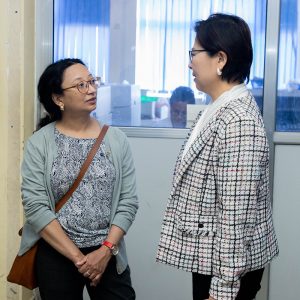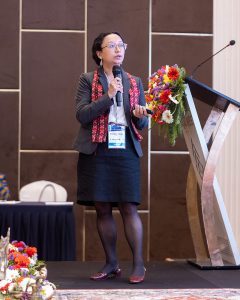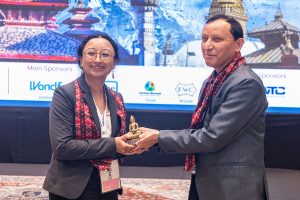UConn Health’s Core Lab Director Shares Expertise in Asia

UConn Health’s Anu Maharjan is back from another international conference where she shared her expertise on lab quality, this time at an Association for Diagnostics and Laboratory Medicine (ADLM) Asia Pacific Working Group workshop in Nepal.
The Global Laboratory Quality Initiative workshop was part of the Nepalese Association of Clinical Chemistry Conference, May 3-4 in Kathmandu, Nepal’s capital.
Maharjan, an assistant professor of pathology and laboratory medicine and the director of UConn Health’s Core Laboratory, also visited laboratories at the Tribhuvan University Teaching Hospital, Nepal’s National Public Health Laboratory, and Samyak Diagnostic, a local pathology lab.

At the workshop, titled “Achieving Excellence in Laboratory Medicine Through Quality, Competency, and Data Science,” Maharjan presented practical applications of implementing laboratory quality and sought to advance patient-centered laboratory services throughout the country.
“There were close to 200 attendees for our workshop and many were from a laboratory medicine background, holding an MD or Ph.D.,” Maharjan says. “It was a humbling experience since some attendees even traveled on bus for more than 24 hours to attend our session.”
One of her presentations was on how to manage and implement point-of-care testing, which she says is a new concept for many laboratorians in Nepal.
“Many in the audience felt confident about implementing the requirements for a successful point-of-care department, but many still wanted a formal regulatory approval for laboratory medicine to oversee point-of-care testing in Nepal,” Maharjan says.
She also discussed risk management strategies.
“Showing monitoring of quality-control plans along with continual communication with internal and external stakeholders helped the audience see the benefits of risk management in laboratory medicine,” Maharjan says. “Many were keen on learning about risk management examples such as delta checking and moving averages to their day-to-day quality plan.”

Her workshop concluded with a case study presentation.
“I presented real-world case studies from laboratories across the United States to illustrate challenges related to reagents, calibrators, instrumentation, and staffing,” Maharjan says. “These examples resonated with our Nepalese audience, highlighting common issues faced in both settings.”
A member of the ADLM since 2017, Maharjan serves as past chair of the group’s New York Metro Local Section and is a member of the Asia Pacific ADLM Global Laboratory Quality Initiative. In that role, she presented at a workshop in Mongolia in 2023.
The ADLM is an international association of more than 70,000 clinical lab professionals, physicians, researchers and business leaders focused on achieving better health through laboratory medicine.
Latest UConn Today
- American Academy of Nursing Announces its 2025 Fellows Including Three UConn School of Nursing FacultyMallory Perry-Eaddy, Ph.D., RN, CCRN, Tiffany Kelley, Ph.D., MBA, RN, NI-BC, FNAP, and Gee Su Yang, Ph.D., RN, will be inducted as Fellows into the American Academy of Nursing.
- Finding New Strategies for Treating a Catastrophic DiseaseFoot and Mouth Disease was eradicated in the US in 1929, and researchers are working to make sure it stays that way
- Geothermal Brine May Hold a Key to Stored Energy ChallengesMaking domestic lithium recovery economically and environmentally viable is a critical goal for meeting the nation’s increasing appetite for energy storage and sustainability
- UConn Medical Students Learning to Strike Out Organ Donation InequitiesNew England Donor Services Launches New Medical Student Summer Immersion Program to Advance the Future of Organ Donation and Transplant Equity.
- End of an Emergency Medicine EraDr. Robert Fuller leaves a legacy at UConn Health and beyond
- UConn’s Institute for Collaboration on Health, Intervention, and Policy Recognizes Faculty Research ExcellenceInCHIP Excellence Awards celebrate UConn and UConn Health faculty who are advancing their field, providing impactful mentorship, and engaging with communities to improve health outcomes.













